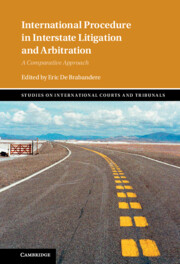Book contents
- International Procedure in Interstate Litigation and Arbitration
- Studies on International Courts and Tribunals
- International Procedure in Interstate Litigation and Arbitration
- Copyright page
- Contents
- Contributors
- Introduction
- Part I Pre-hearing and Selection and Appointment of Judges and Arbitrators
- Part II Post-commencement Litigation Procedure and Strategy
- 5 Interim Measures
- 6 Procedural Challenges and Strategies before the ICJ and ITLOS
- 7 Achieving Greater Access to Justice through Cost-Efficiency
- 8 Opening Up International Adjudication
- Part III Evidence and Witness
- Part IV Post-hearing and Effect of Decisions
- Index
6 - Procedural Challenges and Strategies before the ICJ and ITLOS
The Indian Experience
from Part II - Post-commencement Litigation Procedure and Strategy
Published online by Cambridge University Press: 18 November 2021
- International Procedure in Interstate Litigation and Arbitration
- Studies on International Courts and Tribunals
- International Procedure in Interstate Litigation and Arbitration
- Copyright page
- Contents
- Contributors
- Introduction
- Part I Pre-hearing and Selection and Appointment of Judges and Arbitrators
- Part II Post-commencement Litigation Procedure and Strategy
- 5 Interim Measures
- 6 Procedural Challenges and Strategies before the ICJ and ITLOS
- 7 Achieving Greater Access to Justice through Cost-Efficiency
- 8 Opening Up International Adjudication
- Part III Evidence and Witness
- Part IV Post-hearing and Effect of Decisions
- Index
Summary
This chapter analyses India’s challenges to jurisdiction before the International Court of Justice (ICJ) and the International Tribunal for the Law of the Sea (ITLOS) in 2014 and 2015, comparing the implications of the bodies’ differing procedures and perceptions of their own jurisdiction, and assessing the international relations dynamics at hand. In the Nuclear Zero and Enrica Lexie cases, high-profile matters of lethal weight were repeatedly held hostage by conflicting understandings of jurisdiction. India’s relationship with international jurisdiction, and especially its respective success and failure challenging ICJ and ITLOS jurisdiction, demonstrate how ITLOS procedure is designed to (and successfully does) cabin jurisdictional challenges in interstate disputes. After exploring the courts’ jurisdictional procedure in design and experience, this chapter offers reflections on the impact of the procedural variances, and future implications for states’ behaviour challenging jurisdiction – both for rising powers, who may wish to follow India’s example exerting status in nuanced embrace of international jurisdiction, and for major powers such as the United States, which in time may have to engage international courts if it cannot neutralise the decline of the status which allows it to broadly reject ICJ jurisdiction in state-to-state disputes.
- Type
- Chapter
- Information
- International Procedure in Interstate Litigation and ArbitrationA Comparative Approach, pp. 176 - 201Publisher: Cambridge University PressPrint publication year: 2021



